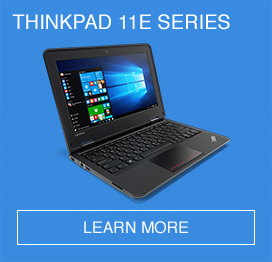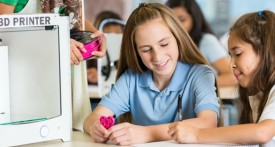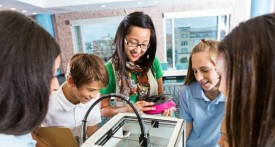EduTech 2016, an event recently sponsored by Lenovo, saw a gamut of topics covered by insightful speakers, ranging from AI-based learning to augmented reality and 'smart' university campuses. Here's a rundown of the highlights.
Personal brains, personal lessons
Neuroscientist Susan Greenfield talked about the central role of the brain in providing us with a “unique and highly prized” identity in the world. This identity is shaped by our experiences, said Greenfield, making it important that young minds be exposed to an enriched learning environment. Laboratory experiments in rats showed that such an environment leads to increased brain cell surface area and more neurological connections. A key element is personalised learning experiences that stimulate the imagination and make use of stories rather than just linear facts, said Greenfield.
AI games and adaptive learning
David Barnett of learning company Pearson Australia spoke about its latest initiative: AI-based games that allow teachers to assess students in real time, based upon how well they adapt to changing situations. It's part of a broader push towards more personalised learning, which is a key focus of the company’s new advanced computing and data science ideas lab/incubator. One project currently underway brings card-based learning into the 21st century, by adding predictive analytics and adaptive learning algorithms.
The smart university campus
Mathew Unwin of Deakin University's eSolutions department discussed the university's research into smart sensors, robotics, artificial intelligence (AI) and machine learning. A recent success story is an augmented reality (AR) smartphone application, which inserts digital overlays over real-world objects around campus. Another is their 360-degree VR campus tour, initially developed for remote and overseas students, but now seeing broader use.
Deakin University is also conducting research into the internet of things (IoT), with the end goal of a 'smart campus'. The model under development makes use of location services, digital passwords and ID, data analytics, sensors and actuators.
Nurturing the creators
At the Lenovo K-12 panel, Microsoft's Trent Ray said future innovation depends on giving today's students the skills to be technology's creators – not just its consumers. James Alexander, founder of Incubate (an award-winning start-up accelerator and entrepreneur program established by the University of Sydney Union), said it's essential that schools teach creative thinking and entrepreneurial skills. This was encouraged during Victoria Education Week, when students were free to experiment with robots and Arduino electronic kits. In some cases, teachers were learning from their pupils.
Also showcased was the University of Wollongong's smart videoconferencing tech, iSee, which promises to revolutionise remote learning with its personalised telepresence and content delivery.
Pervasive research computing
Gone are the days when researchers were content with logging into a shell or terminal session, said Jake Carroll of the Queensland Brain Institute. They need instant access to data from their smart devices, and the big data infrastructure to support it. An example: the Institute's 3D living organism model, which generates 30 gigabytes of data per second. Such projects highlight need for a caching 'fabric' that gives researchers more immediate data access, said Carroll.
Speaking of next-gen computing, University of Adelaide chief information officers Mark Gregory unveiled their HPC Phoenix TOP500-ranked supercomputer, which utilises Lenovo's System x architecture. It will support various data-intensive research projects, including autonomous vehicles, predictive modelling for healthcare, and clean energy.





















